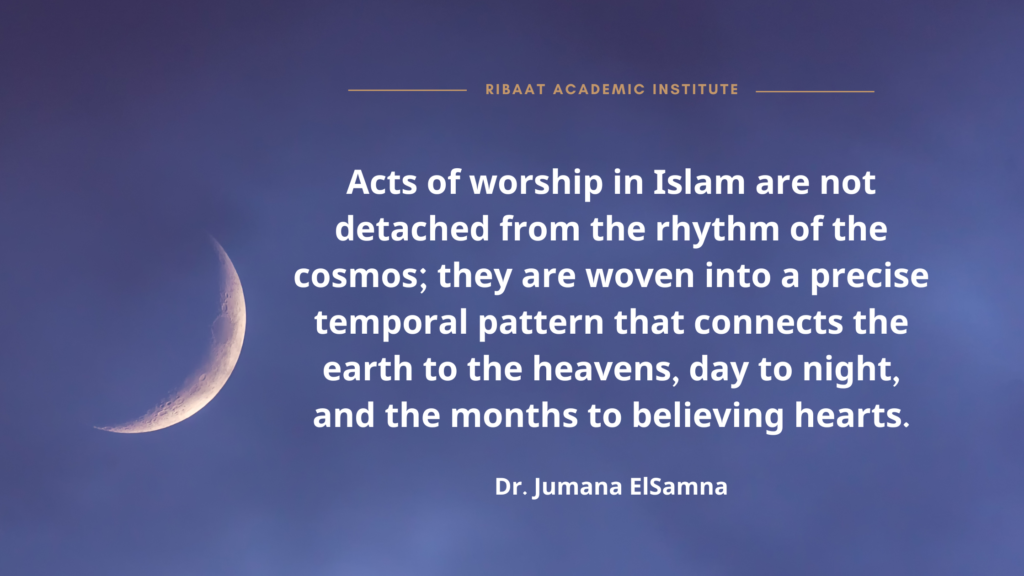In the Islamic worldview, time is not merely a tool for organizing life—it is a sacred dimension of worship, pulsing with spiritual meanings and offering the believer constant opportunities to draw nearer to Allah. Acts of worship in Islam are not detached from the rhythm of the cosmos; they are woven into a precise temporal pattern that connects the earth to the heavens, day to night, and the months to believing hearts. Time is honored, regulated, and infused with divine presence. The believer is not simply living through days and nights but is living within a sacred structure that enhances their spiritual awareness.
The Lunar Rhythm: When the Crescent Signals Nearness
A thoughtful look at Islamic law reveals that major acts of worship are tied to the lunar calendar, not the solar one. Fasting, Hajj, zakat, expiations, oaths, waiting periods—all follow the moon’s phases. Allah says: “They ask you about the crescents. Say, they are time markers for people and for Hajj.” (Al-Baqarah: 189) The phases of the moon are thus not just astronomical phenomena; they are signs by which the Muslim structures his acts of devotion.
Depending on sighting the moon is not just a practical issue—it is, in itself, a form of worship. Ibn Taymiyyah remarked: “Relying on the moon sighting is an act of worship, not merely a means of calculating time.” This reliance reminds the Muslim to observe the heavens with the eyes of remembrance and connection. It anchors time in divine revelation, rather than in mechanical systems.
Today, with the dominance of the Gregorian calendar in daily life, many people only notice lunar months during well-known occasions—Ramadan or Eid al-Adha, for example. But this quiet detachment from the lunar calendar doesn’t only mean forgetting names—it can cause a believer to miss out on sacred spiritual seasons that pass by unnoticed. Time continues to pass, but the heart may not be in sync with the divine rhythm. This disconnect from the Hijri calendar, especially in environments where it is not the default, requires conscious effort to mend.
Worship That Moves with Time: A Divine Schedule
In Islam, time is not just the context of worship—it is a pillar of its validity. For instance, prayer is not accepted before or after its appointed time. Allah says: “Indeed, the prayer is appointed at fixed times for the believers.” (An-Nisa: 103)
This emphasis on time imbues each moment with potential. The believer becomes more mindful, aware that each day carries moments where the doors of the heavens are open, where sins are forgiven, and where rewards are multiplied. Fasting shifts with the months, Hajj is confined to specific days, zakat becomes due after one lunar year, and virtuous days are scattered throughout the year.
So, to lose connection with the Hijri calendar is not simply a logistical issue—it is a missed connection with spiritual opportunities that Allah designed with wisdom and mercy. When we forget that Shawwal marks the beginning of the Hajj season, or that Dhul-Qa’da is a sacred month, we not only lose historical awareness but overlook time-bound windows of nearness.
A Hidden Struggle: The Hijri Calendar in Daily Life
In regions where the Gregorian calendar dominates social and institutional life, many Muslims may grow up only knowing a few months of the Islamic calendar. Ramadan, because of its fasting; Dhul-Hijja, due to Eid al-Adha; and perhaps Rabi’ al-Awwal, because of the Prophet’s birth. Other months pass by with little recognition.
This is not necessarily due to negligence, but to a surrounding structure that does not reflect the Hijri rhythm. Without mosque announcements, community programs, or personal reminders, the sacred texture of time may fade into the background. As a result, important spiritual moments may pass unnoticed. For instance, many do not realize that the months of Hajj begin in Shawwal. After celebrating Eid al-Fitr, life quickly returns to its routine, and the heart may not pause to prepare for the upcoming season of pilgrimage.
Similarly, Dhul-Qa’da, Dhul-Hijja, and Muharram—three consecutive sacred months—may be overlooked entirely, even though they are explicitly named by Allah as sacred. These months are not marked merely for historical reasons. Rather, they are charged with spiritual gravity. They are times when sins weigh heavier, and good deeds are multiplied. Forgetting them is to forget a station of elevation.
Dhul-Qa’da: A Forgotten Season in the Journey to Hajj
We are now in the blessed month of Dhul-Qa’da, one of the four sacred months that Allah magnified in His Book: “Indeed, the number of months with Allah is twelve… among them are four sacred.” (At-Tawba: 36)
Dhul-Qa’da is the eleventh month of the Islamic year and the second of the three months of Hajj. Allah says: “Hajj is during well-known months.” (Al-Baqara: 197), which scholars explain as Shawwal, Dhul-Qa’da, and part of Dhul-Hijja.
Even though no major rites of Hajj are performed during Dhul-Qa’da, it is a sacred time of spiritual preparation, when intentions are purified and hearts begin their journey to the House of Allah. The early generations treated this month with reverence, avoiding wrongdoing and devoting themselves to reflection and worship.
The Prophet ﷺ honored the sanctity of this month by ceasing military campaigns during it, and he performed three of his four ‘Umrahs during Dhul-Qa’da, including the pivotal ‘Umrah of Hudaybiyyah. This further underlines its value as a time of peace, reflection, and intentional worship.
So Dhul-Qa’da is not just the month before Hajj—it is a month of serenity, readiness, and quiet surrender, where the believer begins the spiritual ascent, even if physically distant from Makkah. It is the calm before the storm of Dhul-Hijja, a month to step back, reflect, and cultivate the yearning to be among the pilgrims.
Month After Month: A Spiritual Pulse Through Time
With each new crescent moon, a new season of worship opens. In Muharram, we fast the Day of ‘Ashura which expiates a year of sins. It is also one of the sacred months, a time for turning a new page. In Rajab, we are called to repentance in preparation for Ramadan. In Sha’ban, deeds are raised and hearts are refined. Then comes Ramadan, the month of mercy, purification, and elevation.
In Shawwal, we continue with the six days of fasting, which are like a seal upon the month of Ramadan. In Dhul-Hijja, we meet the Day of ‘Arafa, which wipes away the sins of two years, and Eid al-Adha, the festival of sacrifice. And again in Muharram, we commemorate the salvation of Musa (peace be upon him) and revive the sunnah of fasting.
Each Hijri month carries its own spiritual energy, its own doors to nearness, even if not all are explicitly tied to particular acts. But those who train their hearts to track the lunar rhythm find that time itself becomes a guide to Allah. They do not live time passively; they walk through it with awareness, reverence, and gratitude.
Why Does the Hijri Calendar Matter?
Caring about the Hijri calendar is not a nostalgic act—it is a return to divine time. It is about reconnecting with the sacred rhythm that Allah established to guide His servants.
When we remember the beginning of a sacred month, anticipate the middle of Sha’ban, or prepare for the white days each month, we live in a state of ongoing spiritual attentiveness.
To care about time in Islam is to care about worship. And to align our hearts with the Hijri calendar is to step into a sacred orbit—one that brings us closer to Allah with each passing moon.
So let us attach our hearts to these months—not just to memorize their names, but to reclaim the worship that flows through time. For Allah is the One who said: “Indeed, the number of months with Allah is twelve months in the register of Allah…” (At-Tawba: 36). Let us live these months not as passive observers, but as awakened worshippers, alive to the mercy that flows with every new crescent.
By Dr. Jumana ElSamna, Instructor at Ribaat Academic Institute.

